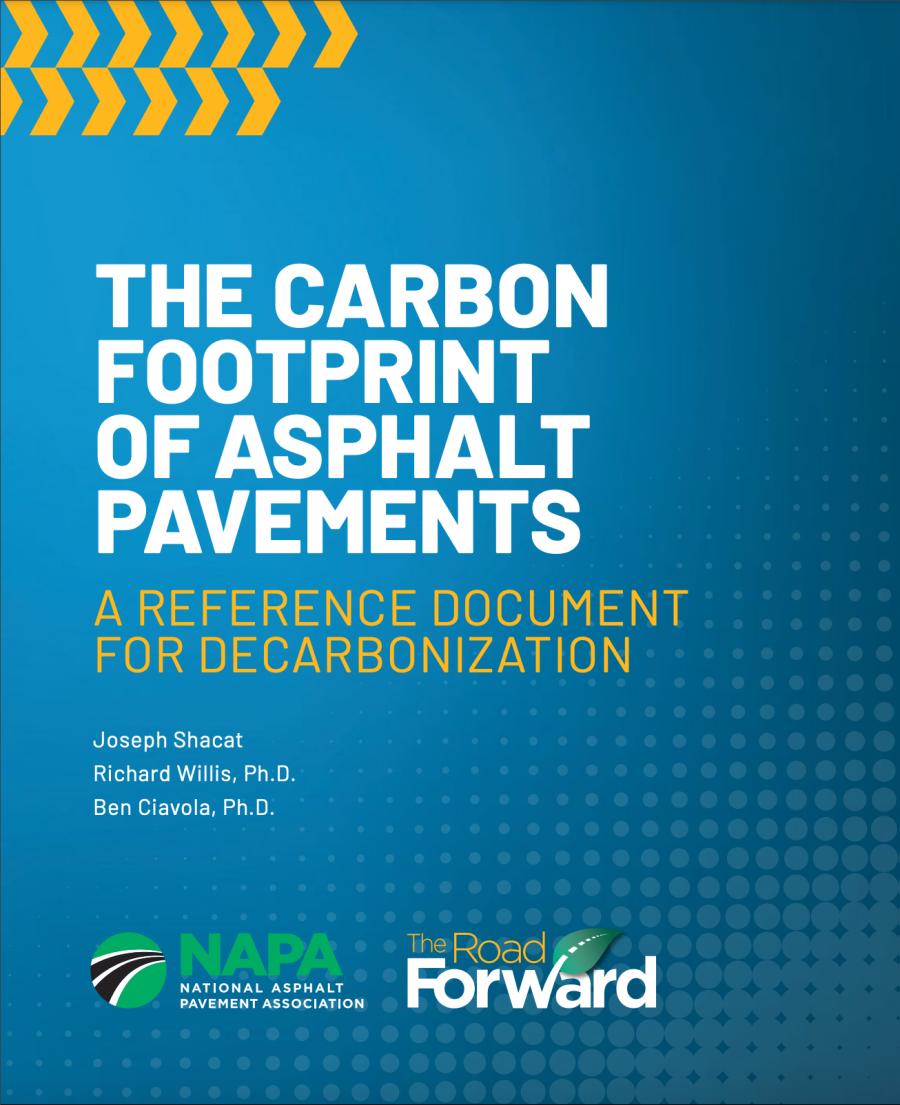In a detailed follow-up to its 2022 GHG Emissions Inventory for Asphalt Mix Production in the United States (SIP 106), the National Asphalt Pavement Association (NAPA) is providing a comprehensive roadmap for reducing greenhouse gas (GHG) emissions associated with asphalt pavements.
In publishing the new report, The Carbon Footprint of Asphalt Pavements: A Reference Document for Decarbonization (SIP 109), NAPA is taking proactive steps to provide a roadmap for the industry and agencies to leverage unprecedented levels of federal funding in the Infrastructure, Investment and Jobs Act (IIJA) of 2021, the Inflation Reduction Act (IRA) of 2022, and other federal programs to reduce greenhouse gas (GHG) emissions.
"The release of this report is impeccably timed," said Heather Dylla, vice president of sustainability and innovation at Construction Partners Inc. "Coinciding with the recent launch of the FHWA's Low Carbon Transportation Materials Program Grants, this report emerges as a critical resource for agency engineers and asphalt mix producers alike. It holds the potential to foster vital discussions and collaborations across the industry, propelling us toward collective sustainability goals."
With the ambitious goal of achieving net zero GHG emissions by 2050 (articulated in the industry's The Road Forward initiative), one objective of the report is to identify the technologies and practices that can be readily adopted or expanded to reduce GHG emissions associated with asphalt pavements. For example, average use of reclaimed asphalt pavement (RAP) nationally remains around 22 percent, according to data published annually by NAPA and FHWA. Yet scenarios show that a mix with 50 percent RAP can reduce cradle-to-gate (A1-A3) emissions by 29 percent compared to a mix without any RAP.
The report focuses on specific actions individual companies and agencies can take to reduce GHG emissions, summarized below. The intended audience includes pavement engineers, asphalt mix producers, paving contractors, policy makers, and other stakeholders with an interest in reducing embodied carbon emissions associated with asphalt pavements.
Sources of GHG Emissions
Authors identify the major sources of GHG emissions throughout the entire life cycle of asphalt pavements, including raw material manufacturing, transportation, asphalt mixture production, pavement construction, use of pavements, maintenance and rehabilitation, and end of life.
Industry-Driven Opportunities
This section outlines various opportunities for asphalt mix producers and paving contractors to reduce GHG emissions. Readily available actions to reduce emissions associated with asphalt mix production include adoption of energy efficiency measures, switching to cleaner fuels, use of recycled materials, and use of biobased materials that capture and store carbon dioxide as a functional component of asphalt pavements. Pavement construction and maintenance activities are another opportunity to reduce emissions through improved construction practices that extend the life of asphalt pavements, improved smoothness to reduce vehicle fuel consumption, and flexible construction scheduling to reduce emissions associated with work zone congestion.
Agency-Driven Opportunities
Recognizing industry cannot decarbonize without the cooperation and leadership of agencies and road owners, the report offers guidance on implementing pavement design considerations, specifications and maintenance practices that prioritize sustainability pavement design considerations. These include incentivizing the use of materials with lower embodied carbon while allowing flexibility for contractors to innovate and prioritizing maintenance to ensure pavement smoothness to reduce vehicle fuel consumption, among others.
Tools for Quantifying GHG Emissions
Authors summarize key tools already available to industry and agencies, such as environmental product declarations (EPDs) and life cycle assessment (LCA) software, that can help quantify GHG emissions and inform decision-making processes.
"This report details actions asphalt mix producers and laydown contractors can take to reduce the carbon footprint of the pavements we construct while making our businesses better," said Ron Sines, vice president for sustainability & decarbonization at CRH Americas Materials Inc. "It highlights the need to collaborate with owners on project designs and specifications to ensure innovations in materials and processes are employed quickly, maximizing their benefits. Most importantly, the report stresses the need to consider the entire asphalt pavement life cycle to ensure the best decisions are made from a decarbonization perspective."
The report's authors — Director of Sustainable Pavements Joseph Shacat; Vice President of Engineering, Research, & Technology Richard Willis; and WAP Sustainability Director of LCA Technology Ben Ciavola — emphasize the importance of collaboration between industry, agencies and academia to advance these strategies. They also highlight the need for further research to better quantify and reduce emissions associated with asphalt pavements.
"This report serves as a critical resource for the asphalt pavement industry and other stakeholders in their efforts to lower emissions toward decarbonizing infrastructure," said NAPA President and CEO Audrey Copeland. "By implementing the recommendations outlined in this report, and furthering research to fill gaps, we can make significant progress toward achieving a sustainable and resilient transportation system."
Today's top stories











